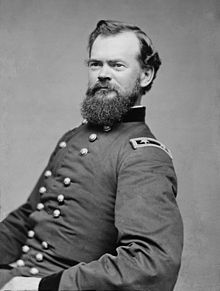 |
| General James B. McPherson |
MEMPHIS, TENN., February 10, 1863.
OFFICERS AND SOLDIERS SEVENTEENTH ARMY CORPS:
Our marching orders have come, and it is for us to respond with promptness and alacrity. We move to capture the stronghold of the rebels in the Valley of the Mississippi. That our success is certain, I have not the slightest doubt, if you bring to the performance of the work the same zeal, ability, and patriotic devotion to your country which have marked your course thus far. Before an indomitable will, an earnestness of purpose, and a solemn resolution not to see our glorious old flag dishonored before a rebel foe, all obstacles will disappear. I know that I do not speak to the heroes of Fort Donelson, Shiloh, Island Number 10, and Corinth in vain. The record of your past services, glorious as it is, is but an earnest of the future. Let no discouraging circumstances at home diminish your patriotism or cause you to falter for one moment in the career of honor which lies before you. We go forward to strike a fatal blow against this most unjustifiable rebellion, a blow which will tell with deadly effect, and cause the heart of every true and loyal man in our country to swell with pride.
We go to plant our flag upon the ramparts of Vicksburg, and I know I but echo your sentiments when I say that each and every one of you desires, no matter what the labor, privation, or danger may be, to battle earnestly and heroically until this great work is accomplished.
Then, indeed, when this rebellion is crushed, can you return to your homes with manly pride, and, pointing to the glorious but triumphant and battle stained banner with "Vicksburg" inscribed upon it, say, We helped to place it there.
[JAS. B. McPHERSON.]
Official Records, Series I., Vol. 24, Part 3, Pages 43-44.
McPherson had finished first in the West Point class of 1853. His star was on the rise and he would live to see Vicksburg captured. But he would not live out the war, dying in 1864 of wounds suffered in the battle of Atlanta. An interesting item in his address is the reference to "discouraging circumstances at home". In an agrarian society, the pull of home (where every hand was needed) was powerful to both sides throughout the war.
No comments:
Post a Comment